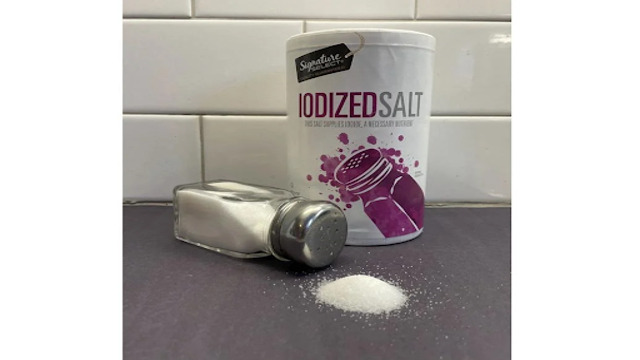
Iodized salt is displayed for a photograph in Philadelphia on Monday, Jan. 6, 2025. (AP Photo/Jonathan Poet)
A 13-year-old boy came to a clinic with a rapidly swelling neck, leaving doctors initially puzzled. Tests ruled out their first diagnosis, but further investigation revealed a missing element—iodine.
While iodine deficiency was once widespread, particularly affecting children in parts of the U.S., the issue seemed to disappear after iodized salt became a staple in the 20th century. Public health campaigns successfully reduced the problem by adding iodine to salt, bread, and other foods. However, recent shifts in diet and food production have led to a decline in iodine intake, sparking concerns among health professionals.
Though iodine deficiency is still rare, reports have emerged of lower iodine levels, particularly in pregnant women and children. Dr. Monica Serrano-Gonzalez, who treated the boy, stressed the importance of raising awareness about iodine deficiency, noting its potential risks, especially to newborns.
Iodine is a trace element found in seawater and soil, mainly along coastal regions. It was discovered in 1811 when French chemist Bernard Courtois observed a purple vapor during an experiment with seaweed ash. Later research revealed iodine's essential role in regulating metabolism and supporting brain development in children.
One of the earliest signs of iodine deficiency is a swollen thyroid, also known as a goiter. The thyroid uses iodine to produce hormones that control bodily functions, including heart rate. When iodine is insufficient, the thyroid enlarges to compensate, a phenomenon that once led to widespread goiter among children in the U.S., particularly in areas known as the "goiter belt."
To combat this, public health officials introduced iodized salt in 1924, and by the mid-20th century, over 70% of U.S. households used it. Iodine was also added to bread and other foods, significantly reducing deficiency. However, the rise of processed foods has led to a drop in iodine intake, as these foods typically do not contain iodized salt. In fact, some families now prefer non-iodized salts, such as kosher or Himalayan rock salt.
Dr. Elizabeth Pearce, a leader in the Iodine Global Network, pointed out that the overall iodine levels in Americans dropped by 50% between the 1970s and 1990s. She emphasized that the iodine in salt is often forgotten by many.
Despite this, most Americans still get enough iodine, although certain groups, such as pregnant women and children, remain vulnerable. Health authorities recommend that pregnant and breastfeeding women consume 150 micrograms of iodine daily—about half to three-quarters of a teaspoon of iodized salt. Yet, studies show that a significant number of pregnant women are not meeting these recommendations. For instance, a Michigan State University study found that a quarter of the 460 pregnant women surveyed had insufficient iodine intake.
Experts have also linked mild iodine deficiency to developmental delays in children, including lower IQ and language skills, although the exact threshold for such effects remains uncertain.
Serrano-Gonzalez and her colleagues have observed iodine deficiency in several children in their clinic, with concerns growing about the increasing frequency of such cases. Children with restrictive diets, such as those with autism who are picky eaters, may be at a higher risk of iodine deficiency.
As iodine levels continue to be a concern, medical professionals urge greater awareness and encourage individuals, particularly those who are pregnant or have young children, to ensure they are getting enough iodine in their diet.















